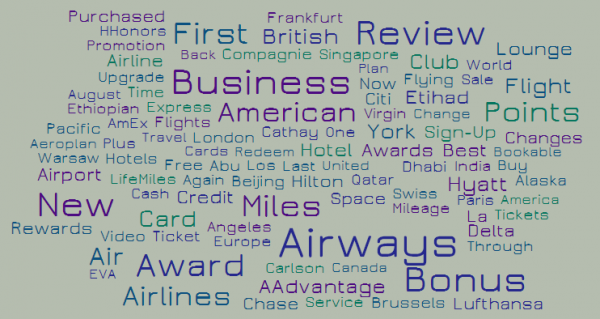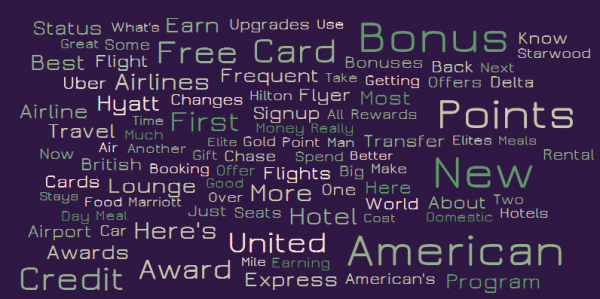Dear readers: I’m pleased to introduce my newest guest columnist, the Hawaiian Airlines® World Elite MasterCard®! The Hawaiian Airlines® World Elite MasterCard® has been helping me with difficult personal issues for many years, so I’m pleased to share the wise counsel with a broader audience! Let’s take a look at this week’s batch of letters…
Travel Is Free is completely wrong about the Citi Double Cash! Plus a couple of BoardingArea word clouds
I don’t care what anybody says or how much money affiliate bloggers are making from it, I think the new Citi Double Cash is great for credit card consumers.
Recently Drew at Travel Is Free lambasted this card as well as some others. I love Travel Is Free, I think it’s one of the best blogs out there, but Drew was (and remains) completely wrong about this card. Let’s go through the virtues:
- It’s 2% cash back
- There is no annual fee
And that’s it! Do you know how many major issuers (JCB Marukai doesn’t count) have 2% cash back cards with no annual fee? One! I’m talking about the Fidelity Amex, of course, but you know that already. It’s been praised by many bloggers, myself included, as one of the best cards out there.
But there’s no pleasing everybody. Travel Is Free writes, “This card sucks. Why are we even discussing it?” Let’s go through TIF’s points one by one and explain why this is a good card:
It doesn’t even have a sign up bonus.
So what? You know what other card didn’t have a sign-up bonus? The Best Buy credit card, and that thing was freakin’ awesome for a while.
The Barclay Arrival Plus comes with $400 via 40,000 points and you earn more value per dollar.
It also has an annual fee, and you have to use the money on travel. Some of us value 2% cash more than 2.2% that has to be used on travel.
I can’t imagine a universe where I would get this card, and I can’t even imagine a scenario where I would ever use it.
How about a universe where the Fido Amex and Arrival Plus are discontinued and where retailers tighten up on letting you buy stuff with a 5% bonus card?
And no other blogger is getting it (unless they are doing very very highe dollars with, no cat bonus, and don’t already have a 2% back card)
Lots of bloggers are getting it, myself included. Citi informs me I’ll be able to convert an existing card on September 7. And I’m not doing very high dollars with no category bonus, and I already do have a 2% cash back card.
This is the Cap1 Venture card with no bonus.
Wrong on two counts. The Venture card has a $59 annual fee, and the rewards are not cash, they are “miles”.
Here’s why it really sucks: If I’m MSing, I’ll 5x that sucker at any grocery, office, gas station, etc… If I’m buying travel, I could at least 3x it and maybe more with that airline or hotel’s particular card.
Yes, that’s why it really sucks… for Drew. But there are plenty of us who don’t do the 5X everywhere game. Drew is committing what’s known as the Christopher Elliott fallacy, where one falsely concludes that because something is wrong for him, it is wrong for everybody else.
Doctor of Credit has a pretty good write-up on the card, where he points out that it may be worth waiting to see if a bonus is offered. Good point! I’ll be doing a conversion from an existing Citi card since I doubt that there will be much of a sign-up bonus, but to each his own.
If you have an unused Citi card in your sock drawer, you might want to think about converting it to the Double Cash. 2% cards don’t grow on trees and they tend to get discontinued periodically (e.g. the Priceline Visa), so it’s good to get in before the plug gets pulled. I don’t think Citi would pull the plug on this any time soon, so there’s no rush.
BOARDINGAREA.COM WORD CLOUDS: Recently Travel Blogger Buzz linked to a Flyertalk kerfuffle between him and Wandering Aramean. The friendly, cordial discussion is more of an inside baseball type of thing, but what was interesting was Seth posted article titles from the past three months for both View From The Wing and One Mile At A Time. I decided to create word clouds from the results just for the heck of it. Here’s VFTW:
 What can we conclude from this? My conclusion is that word clouds are cool, and I wish somebody would post all the titles to my posts in one place so I could make my own.
What can we conclude from this? My conclusion is that word clouds are cool, and I wish somebody would post all the titles to my posts in one place so I could make my own.
This FICO recalibration sounds sketchy
There’s a fascinating new WSJ article, “FICO Recalibrates Its Credit Scores” that is worth your attention. The lede:
Fair Isaac Corp. said Thursday that it will stop including in its FICO credit-score calculations any record of a consumer failing to pay a bill if the bill has been paid or settled with a collection agency. The San Jose, Calif., company also will give less weight to unpaid medical bills that are with a collection agency.
The medical bill thing may make sense since otherwise creditworthy people can get torpedoed by medical expenses. What concerns me is the part about bad debts being excluded once a collection agency has extracted its pound of flesh.
The whole point of a credit score is to predict your chances of going delinquent. Saying that someone has a 780 FICO score if you don’t count those three settled credit card chargeoffs is like saying someone has a pretty good driving record apart from those three DUIs.
Why the changes? Read on:
The moves follow months of discussions with lenders and the Consumer Financial Protection Bureau aimed at boosting lending without creating more credit risk. Since the recession, many lenders have approved only the best borrowers, usually those with few or no blemishes on their credit report.
The changes are expected to boost consumer lending, especially among borrowers shut out of the market or charged high interest rates because of their low scores.
I may be reading too much into this, but the phrase “discussions with lenders and the Consumer Financial Protection Bureau aimed at boosting lending without creating more credit risk” sounds like there’s some pressure to loosen underwriting standards. Is the pressure coming from the government in the name of expanding credit access, or from banks who want to book more short-term profits, or what? I have no idea. We saw both do-gooding and short-term thinking in the real estate credit markets last decade and that did not end well.
Hopefully I’m wrong and nothing bad will come from this. If I’m right, I’d expect credit card divisions will get a nice bump in their profits over the next year or two as they book a bunch of new accounts. With more profits, account valuation models will tell the marketing departments that in fact they can offer even higher bonuses and still come out ahead, so I’m hoping this will lead to a year or two of abnormally high sign-up bonuses.
Bank lending is a perpetual tug-of-war between sales & marketing on the one hand (“Book that loan now and worry about it later!”) and risk management on the other. Risk has mostly been in the drivers’ seat ever since the credit bubble popped several years ago, but perhaps things are reverting back to normal, at least until the new bubble pops.
Finally, I can’t tell from the article if this would work, but consider this scenario: run up a few hundred thousand dollars in credit card bills. Charge off. Wait until the debts are sold to collection agencies for pennies on the dollar, then settle. Rinse. Repeat. Feasible?
Think about this next time you read one of those credit card blogger disclosures
Here’s an interesting article about terms and conditions that appeared in BusinessWeek a few weeks ago. What grabbed my attention is this (emphasis in the text is mine):
To illustrate the false-reassurance problem, Ben-Shahar and Schneider cite an experiment in which people were asked to estimate the number of coins in a jar. Their “advisers” were given a financial incentive to get them to guess too high. Paradoxically, people who were informed of their advisers’ conflict of interest were more likely to be swayed by their bad counsel, perhaps mistakenly assuming that the disclosure would make them more honest.
Have a great weekend!
- « Previous Page
- 1
- 2
- 3
- 4
- 5
- 6
- …
- 8
- Next Page »

Recent Comments